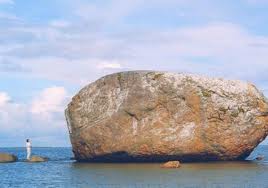 It’s a question as old as time itself. No, actually it’s medieval in origin — dating to around the 12th century:
It’s a question as old as time itself. No, actually it’s medieval in origin — dating to around the 12th century:
Could God create a boulder so heavy that he himself could not lift it?
There is an older version dating to around the 6th century B.C.: Could God deny Himself?
And a more contemporary version:
Could God microwave a burrito so hot, that even He Himself could not open it? The answer to all of these questions is as uncomplicated as it is disappointing.
He created the universe with a single thought. With Him all things are possible.
Here’s how St. Augustine answered the question:
“We do not put the life of God and the foreknowledge of God under any necessity when we say that God must live an eternal life and must know all things. Neither do we lessen his power when we say He cannot die or be deceived. This is the kind of inability which, if removed, would make God less powerful than He is. God is rightly called omnipotent, even though He is unable to die and be deceived. We call Him omnipotent because He does whatever He wills to do and suffers nothing that He does not will to suffer. He would not, of course be omnipotent, if He had to suffer anything against His will. It is precisely because He is omnipotent that for Him some things are impossible.”
Aquinas had a similar view:
“Whatever implies being and nonbeing simultaneously is incompatible with the absolute possibility which falls under divine omnipotence. Such a contradiction is not subject to it, not from any impotence in God, but because it simply does not have the nature of being feasible or possible. Whatever, then, does not involve a contradiction is in the realm of the possible with respect to which God is omnipotent. Whatever involves a contradiction is not within the scope of omnipotence because it cannot qualify for possibility. Better, however, to say that it cannot be done, rather than God cannot do it.”
He is everywhere. He knows everything. He made everything. He can do anything.
Which includes tolerating our silly questions.
Deal with it.
